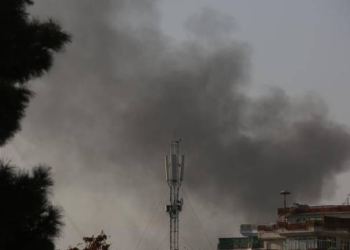Washington: The US Senate on Sunday approved a $118 billion funding package which includes a bipartisan deal to redress the migrant crisis at the southern border and fresh aid for Ukraine, Israel, and other US allies. But its fate is uncertain in the House of Representatives as Speaker Mike Johnson, Republican from Louisiana, said the Bill was “dead on arrival.”
Democrats have embarked on a challenging path forward in the upper Congressional chamber where they hold the majority at 51 to 49, where the Republican leadership quickly panned it. But in the House of Representatives Republicans hold the majority and it will take a tough call on like-minded liberals and conservatives to come together to approve the package.
Reports about the bipartisan agreement were in the offing as President Biden’s aid package for Israel and Ukraine was stuck with Republicans wanting to take the latter out and there was no hope in the lower chamber of the House of Representatives.
The final text of the Bill being released will allow leaders – including those Republicans who have already sworn off the proposal – to evaluate the legislation, media reports said.
The 370-page Bill includes the supplemental aid package requested by President Joe Biden for foreign conflicts, which would appropriate $60 billion for Ukraine, $14 billion for Israel, and $10 billion for humanitarian aid, including in Gaza, the reports pointed out.
Senate Majority Leader Chuck Schumer, said he would launch consideration of the legislation this week as “the overwhelming majority of Senators want to get this done.” But the bipartisan agreement is facing fierce opposition and sharp criticism from the virtual GOP boss and former President Donald Trump and other Republican leaders. The odds of the Bill passing muster in the House of Representatives either appear bleak now, reports said
House Speaker Mike Johnson, said on Sunday evening that the Bill is “even worse than expected” and said it will be “dead on arrival” if it reached the House.
Even some Republican senators slammed it: Senator Mike Lee, said, “I cannot understand how any Republican would think this was a good idea.”
Senator James Lankford, told reporters that he urged his colleagues to consider it before passing judgment. “Why don’t we actually work through the process to see what (lawmakers) actually step out and say they do support this?” he said.
President Joe Biden said in a statement released on Sunday night that it is the “toughest and fairest set of border reforms in decades” and that he strongly supports it.
Schumer called it a “monumental step” and Senate Minority Leader Mitch McConnell said it includes “direct and immediate solutions” and called upon the Senate to “carefully consider the opportunity in front of us and prepare to act.”
The details of the new deal on borders and aid to American allies as revealed by the media, is as follows.
The border control proposal seeks to expand detention capacity and make it harder for people to qualify for asylum but would allow migrants who can claim credible fear to stay in the country and work.
It includes around $20 billion in additional funding to expand the Department of Homeland Security’s (DHS) ability to catch, process, house, and transport migrants and to catch people smuggling fentanyl and other narcotics across the border. The plan also makes it easier for multiple DHS agencies to hire additional employees, USA TODAY reported.
The legislation would end a practice known as “catch and release,” in which migrants caught crossing the border illegally are released into the United States while they wait for the government to process their asylum application. Instead, they would be detained while their claims are evaluated. It would also create a new, voluntary program for migrants to fly back to their home countries on commercial airlines paid for by the US government, the publication said while revealing details of the senate deal.
The deal would expand the number of Green Card-eligible visas every year for the next five years and guarantee that children of H1-B visa holders remain eligible for Green Cards once they turn 18. It includes a pathway to citizenship for Afghans who left their country after the Taliban took over – a version of the Afghan Adjustment Act.
Perhaps the most controversial element of the Bill is a three-year policy to shut down the processing of asylum applications from people who crossed illegally if the number of expulsions and apprehensions of migrants reaches a week-long average of 4,000. It would create a mandated shutdown after a week-long average of 5,000 or more.
There were 302,034 encounters at the southern border in December, according to US Customs and Border Protection – an average of 9,743 per day.
When the border is shut down, migrants caught crossing illegally would be immediately deported. The process would still allow the processing of asylum claims from people who try to enter at official ports of entry.
The border would also reopen after illegal border crossings slow to 75 per cent of that trigger number, or after 270 days have passed in the first year, 225 days in the next, and 180 days in the third year, US media reports said.
“That’ll be one that we’ll have to talk about,” Senator John Lankford, the lead GOP negotiator on the Bill, told reporters Thursday on what criticism to expect on the deal.
“The process is really set up to be able to process more people faster, make decisions faster, deport faster,” he said. “But when the system gets overwhelmed, everyone gets deported until we get caught up.”
The bipartisan package where like-minded Democrats and Republicans thrashed out a quick-fix solution to end the border crisis took months to negotiate, with opposition from extreme Right wingers.
The Democrats want to stick to the open borders policy to help asylum seekers but the influx of immigrants from North and South America has been overwhelming for the Biden Administration.
Negotiators have been debating the contents of the package for months. Originally, Republicans demanded border security legislation in exchange for their support for additional aid for Ukraine, as GOP lawmakers have split on providing additional US assistance to the war-torn country.
(IANS)
















